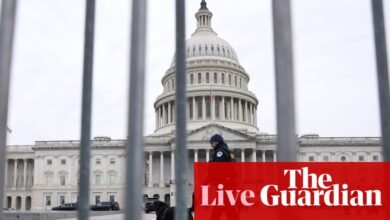Ukraine conflict could be ‘frozen’ sooner rather than later, says Poland’s Tusk after talk with Zelenskyy – Europe live | Europe

Freezing Russian invasion of Ukraine could happen ‘sooner rather than later’, Poland’s PM Tusk after talking with Zelenskyy
The Polish prime minister, Donald Tusk, just told reporters that he spoke with the Ukrainian president, Volodymyr Zelenskyy, this morning and believes that the Russian invasion of Ukraine could soon be “frozen”.
“There are certain signals, I also have an intuition – that perhaps a freezing of the conflict – I don’t want to say the end of the war, but a freezing of the conflict – could happen sooner rather than later.”
He added:
“There is hope for this. Today is the deadline for the ultimatum. President Zelenskyy is very cautious, but still optimistic.
The Ukrainian side is very keen for Europe, including Poland, to take part in shaping this future ceasefire and, later, peace. We are also very keen on this, so that peace can prevail in our region, because that would also have a very positive impact on our security.”
Key events
EU’s von der Leyen says Israeli plans for Gaza ‘must be reconsidered’
Back to Gaza for a moment, the European Commission president Ursula von der Leyen is the latest European leader to join in the condemnation of the Israeli plans for Gaza.
She said that “the Israeli government’s decision to further extend its military operation in Gaza must be reconsidered.”
“At the same time, there must be the release of all hostages, who are being held in inhumane conditions. And humanitarian aid must be given immediate and unhindered access to Gaza to deliver what is urgently needed on the ground”.
She added:
A ceasefire is needed now.
Speculations mount over venue for Trump-Putin summit
Meanwhile, a Fox News reporter claimed that Hungary, Switzerland, Italy and the United Arab Emirates are being discussed as the potential venues for Trump-Putin summit, which could take place “at the end of next week.”
Jacqui Heinrich, Fox News’s senior White House correspondent, reported in a post on X that Russia’s preference was for Hungary, but no decisions had been made.
She added that the talks could also hit into a potential administrative problem, claiming that Ukraine’s Zelenskyy flagged that any territorial concessions would require a national referendum in Ukraine.
China will ‘continue to promote peace talks’ on Ukraine, Xi says after phone call with Russia’s Putin
Chinese president Xi Jinping held a phone call with Russian president Vladimir Putin on Friday, China’s state broadcaster CCTV reported.
The pair reportedly spoke about Ukraine, with Xi saying that China will continue to promote peace talks, and noting that China was glad to see Russia and the US maintain contact, Reuters said.
“China would like to see Russia and the United States maintain contact, improve their relations, and promote a political settlement of the Ukraine crisis,” state broadcaster CCTV quoted Xi as telling Putin, AFP reported.

Jakub Krupa
I will bring you all the latest on European reactions to the situation in Gaza here, but for more detailed coverage of the situation in the Israel-Gaza war, follow our special live blog:
The Netherlands, UK join growing criticism of Israeli plans for Gaza
Several European governments have criticised the Israeli move this morning, with the UK prime minister, Keir Starmer, saying the Israeli government’s decision was “wrong” and urging them “to reconsider immediately”.
In the last half hour, the Dutch government also condemned the latest Israeli plans, with the foreign minister, Caspar Veldkamp, saying it was “a wrong move”.
“The plan of the Netanyahu government to intensify Israeli operations in Gaza is a wrong move. The [Gaza] humanitarian situation is catastrophic and demands immediate improvement. This decision in no way contributes to this and will also not help to get the hostages home,” Veldkamp said in a statement on X.
He added:
“The Dutch government has always been clear: Gaza belongs to the Palestinians. What is needed now is a ceasefire, much more humanitarian aid, Hamas releasing all hostages and a negotiated solution.”
Germany halts military exports to Israel, warns against further military action in Gaza
Meanwhile we are getting big news from Germany, as the chancellor, Friedrich Merz, has just announced that the German government will not approve any exports to Israel of military equipment that could be used in the Gaza Strip until further notice.
The statement acknowledged Israel’s right to “defend itself from Hamas’s terror” and push for the release of the hostages and a ceasefire, but warned that “the even harsher military action by the Israeli army in the Gaza Strip, approved last night … makes it increasingly difficult.”
“Under these circumstances, the German government will not authorise any exports of military equipment that could be used in the Gaza Strip until further notice,” it said.
The statement stressed the German government’s “deep concern” about “the ongoing suffering of the civilian population in the Gaza Strip”, adding that “with the planned offensive, the Israeli government bears even greater responsibility than before for providing for their needs” by allowing aid deliveries.
For what it’s worth, the Polish news website Onet reported yesterday, citing diplomatic sources, on what it believed were some of the proposals for freezing the conflict under discussion.
It claimed that the US proposal included:
-
A ceasefire, not a peace settlement.
-
De facto recognition of the Russian-occupied territories by freezing the issue for 49 or 99 years.
-
Removal of most sanctions imposed on Russia, including on energy.
Onet claimed that, despite repeated Russian demands, the package did not include any provisions on blocking Ukraine’s future accession to Nato, or stopping further defensive military aid for Ukraine.
The Guardian was not able to independently verify this report.
‘Reliable peace is essential for all,’ Zelenskyy says after Tusk call
In his readout from the call with Poland’s Tusk, Zelenskyy was notably less specific about the prospects of ending the war, saying only that the pair discussed “the available diplomatic opportunities” and stressed that “a reliable peace is essential for all”.
He added they also discussed plans for joint defence production, support for Ukrainians resident in Poland, and prospects for Ukraine’s accession to the EU.
“Donald and I agreed that the first negotiation cluster for Ukraine and Moldova should be opened simultaneously. Ukraine and Moldova began this path together and must continue along it together,” he said.
Freezing Russian invasion of Ukraine could happen ‘sooner rather than later’, Poland’s PM Tusk after talking with Zelenskyy
The Polish prime minister, Donald Tusk, just told reporters that he spoke with the Ukrainian president, Volodymyr Zelenskyy, this morning and believes that the Russian invasion of Ukraine could soon be “frozen”.
“There are certain signals, I also have an intuition – that perhaps a freezing of the conflict – I don’t want to say the end of the war, but a freezing of the conflict – could happen sooner rather than later.”
He added:
“There is hope for this. Today is the deadline for the ultimatum. President Zelenskyy is very cautious, but still optimistic.
The Ukrainian side is very keen for Europe, including Poland, to take part in shaping this future ceasefire and, later, peace. We are also very keen on this, so that peace can prevail in our region, because that would also have a very positive impact on our security.”
Irregular border crossings into EU down, but boat crossings to UK up, Frontex says

Lisa O’Carroll
Irregular border crossings into the EU are down 18% in the first seven months of the year, but people taking illegal boat journeys across the Channel to the UK are up 25%, according to new statistics issued by the EU’s border agency.
Irregular crossings toward the UK via the Channel rose by 26% to 41,800 attempts, Frontex said on Friday.
It attributed the surge to new tactics used by people smugglers.
“This increase is attributed to favourable weather, the use of harder-to-detect ‘taxi boats’ that pickup people from various spots on the coast and more migrants per vessel.
Smuggling networks remain active and agile, often disregarding migrants’ safety and putting their lives in serious danger.
One emerging tactic is ‘simultaneous departures,’ where multiple overcrowded boats launch at once. Many vessels are unseaworthy and prone to engine failure, leaving migrants stranded or forced to swim. French authorities respond quickly, often with Frontex support. But boats that remain afloat continue toward the UK. The average number of people per boat has risen to nearly 60, with some carrying almost 100.”
Frontex said the number of people who entered the bloc through an irregular route fell to 95,200 from January to August with the majority of primary routes, including those across the Mediterranean and those to the Canary Islands from West Africa and into eastern Europe through the western Balkans, seeing lower numbers.
However it said “pressure remains high across all three Mediterranean routes.”
Crossings on the east of the Mediterranean into Greece were down by 16% to 26,200. However a new migratory route from Libya into Crete, denounced by the Greek prime minister last month, had emerged in recent months with around 10,000 crossings so far this year.
The route, which in recent years has generated most heated political reaction, from Tunisia into Italy, recorded 36,700 crossings an increase of 9% on 2024. Frontex data suggests smugglers have shifted operations with Libya, cited as the main departure point on the central Mediterranean route.
Smuggling into Spain from Morocco and Algeria was up 11% with criminal gangs charging between €900 and €20,000 per journey, said Frontex.
The West African route saw a drop of 46%, it said.
Finland hopes Trump will move with sanctions on Russia, foreign minister says
The Finnish foreign minister, Elina Valtonen, said in the past hour that she hoped Trump will move ahead with sanctions on Russia.
Speaking to Reuters this morning, she said:
“I certainly hope that President Trump will move forward with those sanctions.
What we do see – and suspect now as well – is that the reason that Russia has again shown some willingness to talk, is that the increased arms deliveries [to Ukraine] are definitely piling up the pressure on Russia to find a way out of the war.”
Valtonen also argued that “the only strategy to end the war in Ukraine is to keep aiding Ukraine”.
Morning opening: Deadline day

Jakub Krupa
The US president Donald Trump’s original deadline for Russia to move on ending its invasion of Ukraine ends today.
Asked if he was ready to follow through on his threats of sanctions and secondary tariffs, Trump told reporters last night:
It’s going to be up to him. We’re going to see what he has to say.
He then added he was “very disappointed” in Putin, but – in an apparent concession to the Kremlin – said he would be ready to meet the Russian leader, regardless of whether he meets with Ukraine’s Volodymyr Zelenskyy.
That contradicted a New York Post report citing a White House official who said that Trump would only meet Putin if the Kremlin leader met Zelenskyy, something Putin has previously rejected.
The Trump-Putin summit could take place as early as next week, with the United Arab Emirates floated as a potential place for the meeting.
But before that happens, will Trump move on sanctions as promised to exert even more pressure on Russia? Let’s see.
Elsewhere, I will be looking at the EU’s reactions on the latest in Israel and Gaza, and keep an eye on Trump’s plans to announce a peace deal between Armenia and Azerbaijan.
I will bring you all the key updates here.
It’s Friday 8 August 2025, it’s Jakub Krupa here, and this is Europe Live.
Good morning.




